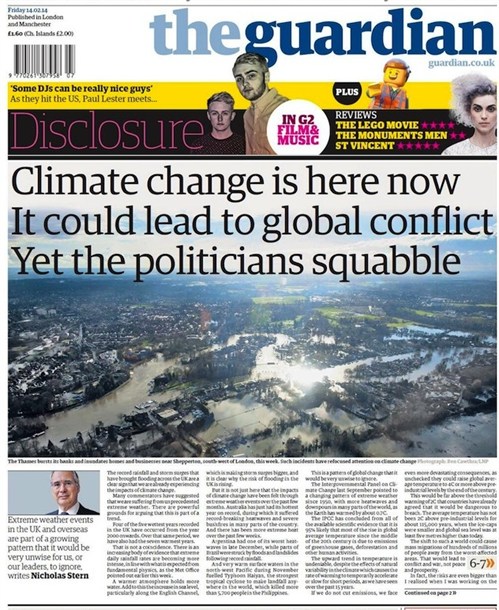Carbon Brief Staff
17.02.2014 | 2:35pmLast Friday’s Guardian carried a front page article by Lord Stern, author of the influential Stern report on the economics of climate change, warning that climate change could cause migration that will lead to “conflict and war”.
The main thrust of Stern’s article is that extreme weather driven by climate change poses a threat to global society – what Stern calls “a pattern of global change that it would be very unwise to ignore.”
The most recent assessment of the climate science from the United Nations’ Intergovernmental Panel on Climate Change ( IPCC) shows that we are now surer than ever that the planet is warming, and that this largely caused by our emissions. The IPCC has also concluded that extreme weather events will get more frequent, more intense, or both in a warming world.
But Stern misses the mark when he talks about climate change, mass migration and war. It is true that there are important connections between climate change, the movement of people and security. But there is little evidence to support the second part of the Guardian headline – “Climate change is here now; it could lead to global conflict”.

A complex relationship
Stern presents a fairly straightforward relationship between climate change and migration, and conflict. He writes of a climate-changed world:
“The shift to such a world could cause mass migrations of hundreds of millions of people away from the worst-affected areas. That would lead to conflict and war, not peace and prosperity.”
The scenario that is most often evoked by those arguing that climate change causes war is that of large numbers of people crossing international borders, at the same time, and staying in their new location permanently. But the evidence suggests that the relationship between climate change and migration is more complex.
Most evidence indicates that climate change impacts are more likely to make people move short distances within countries, rather than across borders. When people are displaced in response to sudden disasters they tend to move within their own countries and eventually return. Although violent conflict can be that cause of displacement, there is little evidence that this kind of displacement leads to war.
When people move in response to slowly unfolding disasters (sea level rise, drought, water stress, desertification), it is very difficult to unpack the climatic factors from the other forces creating their movement.
More broadly, climate change impacts are one of the forces that are adding to the global trend of migration from rural to urban areas. When there is a climate dimension to someone’s movement it is often because their agricultural livelihood has been degraded, and they are seeking work in a nearby city. These migrant workers often send money back to their families, providing them with a more stable income. They may move and work away from home temporarily or seasonally – returning during busy times of the agricultural calendar, or when environmental conditions improve.
There is little evidence linking this kind of migration to war. In fact, the ability to move has a stabilising effect on households who are affected by climate change impacts, who often use migration as a way of strengthening agricultural livelihoods.
Rather than migration leading to conflict, it is actually more likely that conflict will prevent some communities from moving, and therefore make them more susceptible to the impacts of climate change. For example, in the Horn of Africa, war has prevented pastoralists from moving. These communities would usually move with their animals in response to drought. Their inability to move because of ongoing conflict actually meant they suffered the impacts of drought more severely.
Climate change and violence
Several studies have attempted to use statistical analysis to connect climate change to war and various other kinds of violence. The most recent is a synthesis of a number of other studies that have looked at the connection. The paper examined a number of different kinds of violence – from incidents of violent crime, right through to civil war.
The authors found a statistically significant causal relationship between some climatic changes and violence. This might be a very important finding, but the methodology has since been challenged. The analysis includes some studies examining conflict from thousands of years ago (for example the relationship between rainfall and conflict in ancient Egypt). Some dispute whether an examination of ancient societies can have a bearing on the modern world and its conflicts.
Much of the evidence also comes from studies that connect climatic extremes with violent crime, rather than large scale organised warfare. But the analysis does include 21 studies of civil conflict, and several of these studies do find a correlation between climatic extremes and an increase in violence.
The issue has recently been hotly disputed in an exchange in the journal Proceedings of the National Academy of Science. The original research found a relationship between temperature variation and civil conflict in African countries, with more violence occurring in hotter years. After a reexamination of the data, it seems this conclusion is robust.
However, what none of this research shows is that migration caused by climate change was one of causal factors in this violence. Arguing that “climate change causes migration which causes war” scenario could fuel a policy agenda that attempts to stop people moving. When research actually suggests it is more likely to be an inability to move that has a destabilising effect on an area, that’s a problem. The possibility of moving, legally and safely, could provide a much needed form of adaptation for many people.
Alex Randall is project manager of the Climate Change and Migration Coalition, a project run by the Climate Outreach and Information Network.

